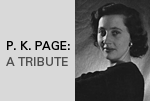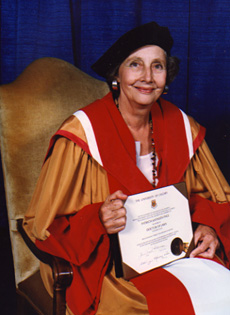She set her own parameters, always. I sat in an audience one time before I met her, in Ottawa, listening to her read. I understood nothing, but magic rippled through the room, like a silken tapestry.
I was with a student one day in my office in Victoria when the phone rang, and P. K. said, “Isn't it time that we met?” Wonderful.
She came to my place for tea. We spoke of poetry but also, somehow, of loves that can pull one across a continent, and turn out bitter. She asked questions, and listened to replies. She discovered I had not heard of Elizabeth Bishop. I store away with my best memories this elegant woman on my shabby couch, reciting a Bishop villanelle.
I attended some storytelling sessions with her, surrounded in the firelight by artifacts from—was it Iraq?
A friend and I were starting a writing school, and coveted her name and her presence. I invited her to lead a storytelling workshop. She accepted! It was a kind gesture on her part, although she may also have been intrigued.
At a major poetry reading, we met in the aisle and she made a glancing remark about wanting to hear “the real poets.” I retorted, “If you can tell who's real!” I knew what I knew, but knew also that she knew much more.
Outside the Church
black-and-white decorum, perfected,
each child a syllabic count
in three-line formal haiku
one a red-streaked blonde, one back-combed fluff
and complicated tendrils, one buzzcut--
disparate harmonies held inside
sliding lilts of sound
and then Mary McLoughlin sings “Sisters”
--music by Jan Skarecky—each name
and hairdo dear, I am guessing, to the woman who, with
smooth cheek, burgundy scarf, head tilted back, hears her own young
words lift, then settle, lullabies worked in—pure
grief welling through. The singer's all in black, with sparkles and bare arms,
curled hair like the poet's, tilting once again--
a song of green blood in the groin, and maidenhair, damp wood
outside the church, in the dark, a cat screams
daffodil T-shirt volunteer slips out
and does not come back.


 Margaret Slavin Dyment
Margaret Slavin Dyment


